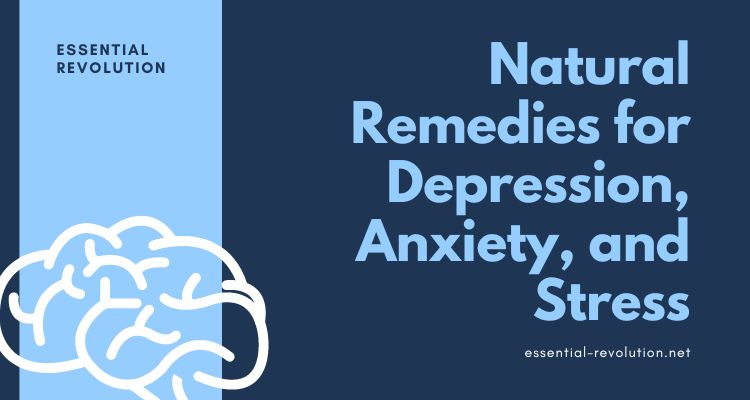Discover the power of natural remedies for depression, anxiety, and stress to improve your mental well-being holistically and naturally.
Holistic Approaches to Mental Wellness
Understanding Depression, Anxiety, and Stress
Mental health disorders such as depression, anxiety, and stress affect millions worldwide. Depression often manifests as persistent sadness, loss of interest in activities, and fatigue. Anxiety includes excessive worry, restlessness, and physical symptoms like heart palpitations. Stress, often a response to external pressures, can lead to both physical and mental health issues if not managed properly. While conventional treatments like medication and therapy are effective, natural remedies for depression, anxiety, and stress offer complementary approaches that can enhance overall well-being.
Benefits of Natural Remedies for Depression Anxiety and Stress
Natural remedies for depression, anxiety, and stress have several advantages. They are typically accessible, have fewer side effects compared to pharmaceutical treatments, and can be integrated into daily routines. Moreover, these remedies often focus on the holistic well-being of an individual, addressing physical, emotional, and psychological aspects simultaneously.
Herbal Remedies
St. John’s Wort
St. John’s Wort is one of the most studied herbal remedies for depression. This plant has been used for centuries to treat mood disorders. It works by increasing the levels of serotonin, dopamine, and norepinephrine in the brain, which help regulate mood. Several studies have shown that St. John’s Wort can be as effective as antidepressants in treating mild to moderate depression.
Lavender
Lavender is renowned for its calming effects and is widely used in aromatherapy. It can help reduce anxiety and stress levels significantly. Lavender essential oil, when used in a diffuser, added to a bath, or applied topically, can promote relaxation and improve sleep quality, making it an excellent natural remedy for depression, anxiety, and stress.
Valerian Root
Valerian root is another powerful herb that many use to alleviate anxiety and stress. It works by increasing the levels of gamma-aminobutyric acid (GABA) in the brain, which has a calming effect on the nervous system. Valerian root is often taken as a supplement or tea before bedtime to improve sleep quality and reduce anxiety.
Dietary Adjustments
Omega-3 Fatty Acids
Omega-3 fatty acids, found in fish oil, flaxseed, and walnuts, play a crucial role in brain health. Research suggests that omega-3s can help reduce symptoms of depression and anxiety by improving brain function and reducing inflammation. Including these foods in your diet or taking omega-3 supplements can be an effective natural remedy for depression, anxiety, and stress.
Probiotics
Gut health is increasingly linked to mental health, with probiotics playing a significant role. Probiotics, found in yogurt, kefir, sauerkraut, and other fermented foods, can help balance gut bacteria and improve mood. A healthy gut can produce more serotonin, a neurotransmitter that contributes to feelings of well-being and happiness.
Balanced Diet
A balanced diet rich in fruits, vegetables, whole grains, and lean proteins provides essential nutrients that support mental health. Vitamins such as B-complex, D, and minerals like magnesium and zinc are particularly important. Ensuring adequate intake of these nutrients can help manage symptoms of depression, anxiety, and stress.
Mind-Body Practices
Yoga
Yoga combines physical postures, breathing exercises, and meditation to promote relaxation and reduce stress. Regular yoga practice can help decrease the symptoms of depression and anxiety by lowering cortisol levels, the body’s primary stress hormone. It also enhances the production of endorphins, which are natural mood lifters.
Meditation
Meditation is a powerful practice that helps calm the mind and reduce stress. Techniques such as mindfulness meditation involve focusing on the present moment and observing thoughts without judgment. This practice can reduce symptoms of depression and anxiety by promoting a sense of peace and acceptance.
Tai Chi
Tai Chi, a form of martial arts, focuses on slow, deliberate movements and deep breathing. It has been shown to reduce stress, anxiety, and depression by enhancing mental clarity and promoting relaxation. Tai Chi can be particularly beneficial for older adults or those with physical limitations, as it is low-impact and gentle on the body.
Lifestyle Changes
Regular Exercise
Regular physical activity is one of the most effective natural remedies for depression, anxiety, and stress. Exercise releases endorphins, which act as natural painkillers and mood elevators. Activities like walking, running, swimming, and dancing can significantly reduce symptoms and improve overall mental health.
Adequate Sleep
Sleep plays a vital role in regulating mood and cognitive function. Poor sleep can exacerbate symptoms of depression and anxiety. Establishing a regular sleep routine, creating a restful environment, and avoiding stimulants before bedtime can improve sleep quality and reduce stress.
Social Connections
Maintaining strong social connections is crucial for mental health. Interacting with friends, family, and participating in community activities can provide emotional support, reduce feelings of isolation, and enhance mood. Also, building a solid support network is an essential component of natural remedies for depression, anxiety, and stress.
Environmental Factors
Nature Therapy
Spending time in nature can have profound effects on mental health. Nature therapy, or ecotherapy, involves engaging with natural environments to reduce stress and improve mood. Activities like hiking, gardening, or simply walking in a park can lower cortisol levels as well as increase feelings of well-being.
Aromatherapy
Aromatherapy uses essential oils extracted from plants to promote mental and physical well-being. Oils such as chamomile, bergamot, and ylang-ylang have been shown to reduce anxiety and stress. Diffusing these oils, adding them to bathwater, or using them in massage can enhance relaxation and mood.
Supplements
Magnesium
Magnesium is a mineral that plays a crucial role in brain function and mood regulation. Deficiency in magnesium is linked to increased symptoms of depression and anxiety. In addition, taking magnesium supplements or incorporating magnesium-rich foods like spinach, almonds, and black beans into your diet can be beneficial.
Vitamin D
Vitamin D, often referred to as the “sunshine vitamin,” is essential for mental health. Low levels of vitamin D are associated with depression and anxiety. So, spending time outdoors in sunlight and taking vitamin D supplements can help improve mood and reduce stress.
5-HTP
5-Hydroxytryptophan (5-HTP) is a naturally occurring amino acid that is a precursor to serotonin. Supplements of 5-HTP can help increase serotonin levels in the brain, which can improve mood and alleviate symptoms of depression and anxiety.
Conclusion
Natural remedies for depression, anxiety, and stress offer a holistic approach to improving mental health. From herbal remedies and dietary adjustments to mind-body practices and lifestyle changes, these methods can complement traditional treatments and enhance overall well-being. So, by integrating these natural remedies into your daily routine, you can take proactive steps towards managing mental health challenges and achieving a balanced, fulfilling life.
Final Thoughts about Natural Remedies for Depression Anxiety and Stress
While natural remedies for depression, anxiety, and stress can be highly effective, it is important to consult with healthcare professionals before starting any new treatment regimen, especially if you are currently taking medication or have underlying health conditions. A balanced approach that combines conventional and natural treatments, tailored to individual needs, can provide the best outcomes for mental health and overall well-being.

